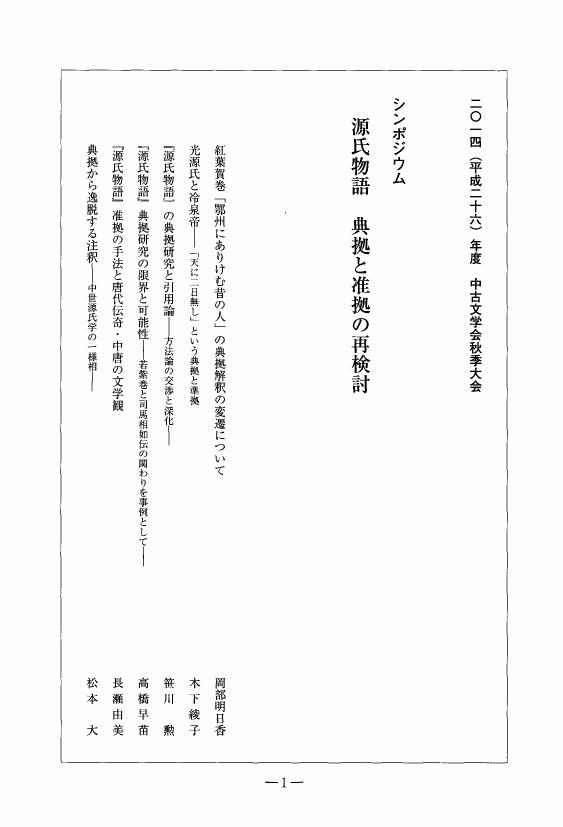8 0 0 0 OA 研究発表 源氏物語の漢訳受容をめぐって ―明治時代を中心に―
- 著者
- 岡部 明日香
- 出版者
- 国文学研究資料館
- 雑誌
- 国際日本文学研究集会会議録 = PROCEEDINGS OF INTERNATIONAL CONFERENCE ON JAPANESE LITERATURE (ISSN:03877280)
- 巻号頁・発行日
- no.28, pp.97-111, 2005-03-01
Genji Monogatari was written in the middle of the Heian period, but from the Kamakura period on, Chinese poetry (kanshi) based on the story and attempts to translate it into Chinese (kanbun) were made. HikaruGenji Monogatari Wo Fusuru Shi (Shouou 4) features kanshi composed for each chapter, a style that was carried on through to the late Edo period with Shi Shi Ginpyou (Tenpou 9, by Narushima Chikuzan). In the Meiji era, prose kanbun interpretations appear, such as “Wakamurasaki”, “Nakagawa Suisou Bikou (Hahakigi)”, and “Utsusemi” from Yakujun Kigo (Meiji 18, by Kikuchi Sankei) and Shi Shi (Meiji 26, Kawai Jirou).This presentation will look at such “kanyaku Genji” works, focusing on the Meiji era. The Edo period work Shi Shi Ginpyou continued to exert an influence into the Meiji era, and will therefore be looked at as well.Shi Shi Ginpyou was published in Kagetsu Sinshi (Meiji 12), a magazine run by Chikuzan’s son Narushima Ryuuhoku. In Showa 15, Chinese scholar Taniguchi Kairan of Shimane published a commentary as well as composed “Ji-in” (Chinese poems on the Genji Monogatari).Yakujun Kigo features kanyaku reneditions of a variety of works of Japanese literature, and includes partial translations of the Genji Monogatari. The Chinese scholar Adachi Keitei of Nagasaki published the work in Meiji 44 after Sankei's death, but “Nakagawa Suisou Bikou (Hahakigi)” and “Utsusemi” were excluded by Keitei based on his personal ethics. Kikuchi Sankei was also involved in editing Kagetsu Shinshi, and had an interesting connection to Shi Shi Ginpyou.Only the Utsusemi chapter remains from Shi Shi.This presentation will examine the characteristics of each interpretation, as well as the influences seen in and exerted by the works. Modern Chinese studies around the time of the Mejii Restoration carried over the literary traditions of Japan through to the Edo period while including the products of the new era. We will also try and examine what the Chinese scholars of such a time thought of the Genji Monogatari.
4 0 0 0 OA 『紫式部日記』左京の君事件の記述態度 -彰子後宮の漢詩文受容の問題からの考察-
- 著者
- 岡部 明日香
- 出版者
- 早稲田大学国文学会
- 雑誌
- 国文学研究 (ISSN:03898636)
- 巻号頁・発行日
- vol.142, pp.40-51, 2004-03-15
2 0 0 0 OA 秋好中宮と勤子内親王・雅子内親王の史実 ―絵画と斎宮―
- 著者
- 岡部 明日香
- 出版者
- 中古文学会
- 雑誌
- 中古文学 (ISSN:02874636)
- 巻号頁・発行日
- vol.90, pp.94-107, 2012-11-22 (Released:2019-05-18)
1 0 0 0 OA 源氏物語 典拠と准拠の再検討
1 0 0 0 OA 源氏物語蜻蛉巻の『上陽白髪人』引用について ―幻巻からの物語内引用と併せて―
- 著者
- 岡部 明日香
- 出版者
- 中古文学会
- 雑誌
- 中古文学 (ISSN:02874636)
- 巻号頁・発行日
- vol.78, pp.119-128, 2006-12-15 (Released:2019-05-18)
1 0 0 0 OA 『源氏物語』手習巻の新楽府引用と浮舟物語 ―「古塚狐」・「井底引銀瓶」と「陵園妾」―
- 著者
- 岡部 明日香
- 出版者
- 中古文学会
- 雑誌
- 中古文学 (ISSN:02874636)
- 巻号頁・発行日
- vol.71, pp.34-44, 2003-05-30 (Released:2019-05-18)



